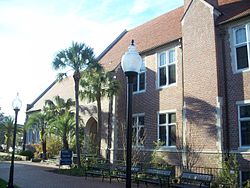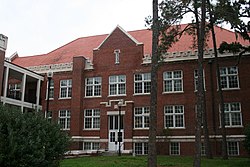University of Florida College of Liberal Arts and Sciences
 From Wikipedia - Reading time: 9 min
From Wikipedia - Reading time: 9 min
 | |
| Type | Public |
|---|---|
| Established | 1910 |
Parent institution | University of Florida |
| Endowment | (university-wide)[1] |
| Dean | Dr. Mary Watt (Interim) |
| Undergraduates | 11,000 |
| Postgraduates | 1,500 |
| Location | , , United States 29°38′56.9″N 82°20′38.8″W / 29.649139°N 82.344111°W |
| Website | www |
 | |







The University of Florida College of Liberal Arts and Sciences (CLAS) is the college for the liberal arts and sciences of the University of Florida, and the largest of the university's 16 academic colleges. Most core curriculum classes, 43 majors, and 47 minors are part of the college. The university reports that more than 700 faculty members teach at least 35,000 students each year, with more than 11,000 undergraduates pursuing a degree from the college and 1,500 graduate students are also attaining graduate degrees in the college.[2]
The college faculty have received a variety of national and international awards, including the Pulitzer Prize,[3] Guggenheim Fellowships,[4] Senior Fulbright Awards, National Science Foundation Fellowships, Presidential Young Investigator Awards and National Endowment for the Humanities Fellowships. They hold memberships in the National Academy of Sciences, the Nobel Prize Committee, the Swedish Royal Academy of Sciences and the Royal Societies of London and Edinburgh.[2]
Liberal Arts and Sciences students have numerous scholarships and awards for their academic performance. During the past several years, CLAS students have been recognized as a Rhodes Scholar, Barry Goldwater Scholars, Harry Truman Scholars, and James Madison Scholars.[5]
National rankings according to US News (2020 edition)
[edit]| Department | Ranking |
|---|---|
| Analytical Science | 11th overall |
| Criminology | 19th overall |
| Physics | 37th overall |
| Psychology | 39th overall |
| Statistics | 40th overall |
| Chemistry | 41st overall |
| Computer Science | 49th overall |
| History | 53rd overall |
| Earth Science | 54th overall |
| Economics | 55th overall |
| Sociology | 57th overall |
| Political Science | 61st overall |
| Mathematics | 62nd overall |
| English | 67th overall |
| Biological Sciences | 73rd overall |
Departments
[edit]
|
Research Centers and Institutes
[edit]
|
|
Additional Programs and Centers
[edit]
|
Deans of the College of Liberal Arts and Sciences
[edit]| Years | Dean |
|---|---|
| 1910–1934 | James N. Anderson |
| 1934–1947 | Townes R. Leigh |
| 1948–1971 | Ralph E. Page |
| 1972–1978 | Calvin A. VanderWerf |
| 1978–1988 | Charles F. Sidman |
| 1988–2000 | Willard W. Harrison |
| 2000–2007 | Neil S. Sullivan |
| 2007–2008 | Joe Glover (interim) |
| 2008–2014 | Paul D'Anieri |
| 2014– | Dave Richardson |
Research
[edit]The College of Liberal Arts and Sciences was awarded $43.9 million in annual research expenditures in sponsored research for 2024.[7] Liberal Arts and Sciences researchers have been involved in groundbreaking research in a variety of disciplines. Their achievements include contributions of the algorithm and input optics for LIGO, which has detected several "chirps" of gravitational waves produced by colliding black holes. Other significant research includes Project Implicit, which studies implicit bias.[8] The college includes experts on pressing topics such as climate change.[9]
Alumni
[edit]Notable alumni of the college include politicians Bob Graham, Debbie Wasserman Schultz, and Marco Rubio; former ambassador Dennis K. Hays, Kathy Fields, co-creator of Proactiv and Rodan + Fields skincare; Nobel Prize-winning chemist Robert Grubbs; award-winning authors Kate DiCamillo and James Grippando, and Pulitzer-winning journalist Dexter Filkins.
See also
[edit]Notes
[edit]- ^ As of June 30, 2021. U.S. and Canadian Institutions Listed by Fiscal Year 2021 Endowment Market Value and Change in Endowment Market Value from FY20 to FY21 (Report). National Association of College and University Business Officers and TIAA. 2022. Retrieved December 17, 2022.
- ^ "About the College." University of Florida College of Liberal Arts and Sciences [1]
- ^ "Pulitzer winners". www.pulitzer.org. Retrieved 6 May 2023.
- ^ "Under the Skin". 27 June 2016.
- ^ "CLAS for Faculty/Staff". www.clas.ufl.edu. Archived from the original on 2005-05-14.
- ^ "About us — Tea". Archived from the original on 2019-08-02. Retrieved 2019-08-02.
- ^ "UF research spending at record $1.26 billion for FY2024". news.ufl.edu. Retrieved 2024-08-11.
- ^ "Measuring the implicit biases we may not even be aware of".
- ^ "Hurricane Matthew's Destructive Storm Surges Hint at New Normal". 8 October 2016. Archived from the original on October 9, 2016.
 KSF
KSF